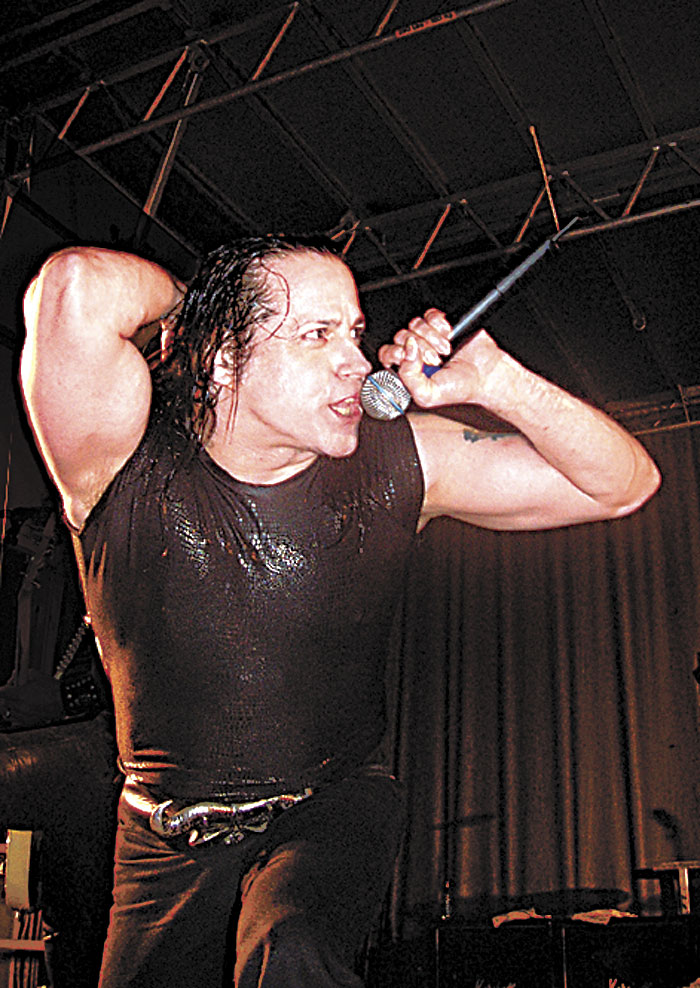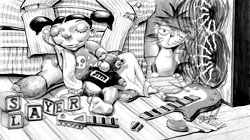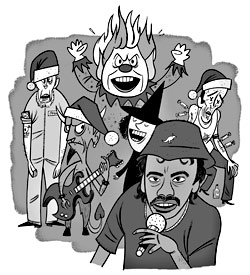Glenn Danzig is the devil’s curator for the “Blackest of the Black” Tour, a metal mini-festival he’s been presenting and headlining intermittently since 2003. And for the headbanger set, the tour has a little bit of everything. Ohio’s Skeletonwitch blends black metal, death metal, and thrash into old-school, rip-yer-face-off shredderation. Dimmu Borgir plays some of the world’s most elaborate black metal (the Prague Philharmonic Orchestra backed the Norwegian band on 2003’s Death Cult Armageddon), and has a stage show to match. Meanwhile, the weapon of choice for Portugal’s Moonspell is midtempo double-bass drum kicks, deployed in slower tunes and guttural-yet-melodic vocals. Last but not least there’s Upland, California’s Winds of Plague, which deals a modern-metal melange of black-metal keyboards, death-metal growls, and hyper-blast percussion.
Even if you’ve followed Danzig’s varied career, these bands are surprising company to find him keeping. After all, Danzig is one of the most enduringly vital creative forces from the old-school punk and hardcore scenes, which were the underground alternatives to big, loud, long-haired metal. He founded the Misfits in 1977; fronting the band, he belted out the tunes like a morbid Jim Morrison—and he wouldn’t have been caught dead at a Judas Priest show.
He just didn’t like that kind of metal.
“Punk and metal are very similar,” Danzig says. “When the first Misfits record came out, it was called ‘horror metal-punk.’ The only thing that separates [metal and punk] are long, boring leads. And maybe a couple other little things, like whiny, screamy vocals. That all changed in metal. You listen to something like Slayer—there’s none of that ’80s silliness. I think Metallica really changed a lot of it. And Sabbath has always been an influence.”
The “horror metal-punk” tag was totally appropriate for 1983’s controversial Earth A.D./Wolf’s Blood album, which was recorded with Spot, the polarizing SST house engineer best known for Black Flag’s records. The Misfits’ final album jettisoned the band’s trademark melodies and went straight for the jugular in a blast of distortion. Punks were disappointed, but hardcore kids got it. And metalheads who’d previously hated “that punk shit” suddenly saw the light. The singer says it wasn’t that much of a departure—not if you were there.
“Back then, at least here in America, people just did not know how to record those fast guitars,” Danzig explains. “Until we got to work with Spot, it just didn’t sound like [it did] live. [Earth A.D.] is what the Misfits sounded like live.”
After the Misfits imploded, the frontman launched Samhain, a band that was both punkier and artier. In New York for a showcase, Danzig met producer Rick Rubin, a future Grammy winner and music-biz overlord who had just returned to his hard-rock roots after working with the Beastie Boys and LL Cool J. Together, Danzig and Rubin conceived a musical vehicle that would be called “Danzig” but would feature a different backing band on each album. The group hasn’t changed with every single record, but players have come and gone: Different lineups recorded metal, industrial, goth, and darkwave albums that would have been hailed as revolutionary if they’d come from within the scene.
This year’s “Blackest of the Black” trek commemorates the 20th anniversary of Danzig, his band’s self-titled debut and one of the first releases on Rubin’s Def American label. The sparse, bluesy record remains an underrated rock classic, an album on which Rubin and engineer Steve Ett spit-shined Danzig’s gestating material, like the murderous Samhain nugget “Twist of Cain” and the fan favorite “Mother” (which found a second life as a single in 1993).
But don’t show up late, figuring Danzig will save those two songs for encores: His band will open these shows with “SkinCarver” (from 2004’s Circle of Snakes), then play favorites from all eight Danzig albums in chronological order. The singer says he’ll also “most likely” play a rare solo acoustic song—but, chuckling, he refuses to say which one.
“One of the reasons I’ve had this whole career, whether it’s with Samhain, the Misfits, or Danzig, it’s being able to defy genres,” Danzig says. “I like it like that, to blur the lines. That’s really what it’s about.”






